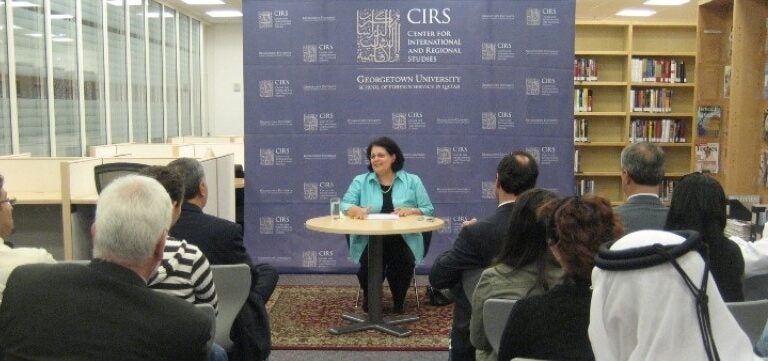CIRS Faculty Lectures, Dialogue Series, Race & Society, Regional Studies
Amira Sonbol on Cairo Women of the Darb

On October 30, 2007, CIRS hosted its inaugural Monthly Dialogue Series event with a presentation by Professor Amira Sonbol. Professor Sonbol discussed her research on Cairo women’s lives with an audience of over fifty guests, who ranged from Education City students and faculty to ambassadors and other diplomats posted in Doha.
In her portrayal of Cairo women of the darb —small alley or quarter in Arabic—Sonbol stressed that we must stop viewing women as an object of oppression in the Islamic world. On the contrary, women have been a vibrant part of life in Cairo for centuries—only recently did modern state formation begin to exclude women from professions such as medicine, manual labor, and factories. “Women worked every job you can imagine,” Sonbol said. “They had to work, at least in the darb.”
To prove this thesis, Sonbol has spent years analyzing records in Egypt, Jordan, Palestine, Turkey, and the Gulf.
“Text is the product of a living society, not a dead society,” Sonbol claimed.
Using fatawa (judgments made by Islamic scholars) and court records, Sonbol demonstrated women’s active participation in society and, for instance, the ease with which they could obtain a divorce in Egyptian courts. She has also seen considerable proof of the maneuverability of women within the social hierarchy of the time, evidenced by the wealth of prenuptial agreements where women made very specific demands of their husbands. If these agreements were violated, the woman could easily secure a divorce in court.
Sonbol then traced the changes in laws since the British takeover and the arrival of the “modern age.” The many public setbacks that women faced during this period disprove the commonly-held belief in progress—that as time advances, human society necessarily improves. The centralization of the state in the modern era actually relegated women to the private sphere.
“Women are now blocked from jobs they could do before,” Sonbol noted. Additionally, at the beginning of the 19th century women held 40 percent of the property in Egypt, whereas by the end they held only ten percent, she claimed.
In 1827, Muhammad Ali Pasha opened a hospital in Cairo and many women were specialized doctors. It was not until the 1893 British takeover of Egyptian schools that women were excluded from this profession. Only now are women regaining some of the ground they lost in the beginning of the modern age.
One of the results of British rule was the 1920s’ passage of “personal status law”, which illegalized women seeking divorce and women holding property. While many outsiders claim that women’s disadvantages stem from Islam, a deconstruction of the personal status law demontrates that these laws were the real culprit. Only in the modern age did women come to be viewed as dependents of their husbands, and not as individuals, in the legal system.
Sonbol relayed how she first became interested in women’s history as she researched the clergy of Al-Azhar. As she worked in the Egyptian archives, she discovered many documents demonstrating women’s active role in history. She began to realize that the image she held of women in the past was the wrong one.
Currently, Sonbol is working with students to collect a history of women in the Gulf. While it initially appeared that this would imply the construction of a history from scratch, Sonbol has found that the scholarly study of the question of “women” needed to be reframed. Looking for women’s history was a narrow, modern approach. Instead, the group is using a wider variety of sources and has found rich material, especially in Oman.
Summary prepared by Kathryn King. Kathryn is a CIRS staff member.